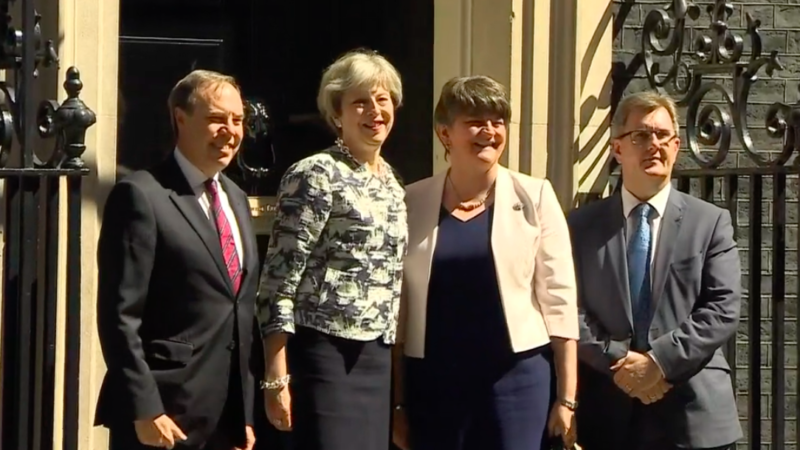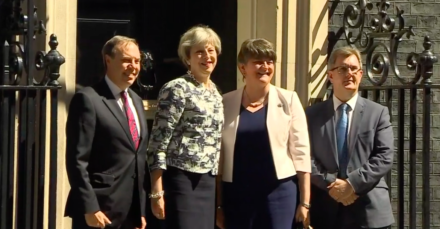

Study your political adversary
While the Conservatives have driven UK politics for best part of a decade, the Left has spent precious little time analyzing the strategy and condition of the political adversary. Moreover, the Tories are still in power, albeit it weakly and, conversely, Labour has yet to win an election. While some think the next one is a done deal, unfortunately it is not.
But the tide certainly looks like it has turned. Labour pulled off a surprise in the June general election, polling nearly 40 per cent. What appeared in early 2017 to be Labour’s crisis, rapidly turned into the crisis of conservative political hegemony and that of the Regressive Alliance – a hard Brexit-orientated formation comprising the Tory Right; UKIP; DUP, anti-immigrant organisations and sections of the media such as the Mail and Sun.
The main achievement of the ‘Corbyn Surge’ was to deny the Conservatives a working majority and to force them into an unstable parliamentary pact with the DUP. But one of the less talked about effects of the ‘June surprise’ is that the electorate are not yet used to the idea of a Corbyn Government. The current situation could thus be seen as one of volatility, as well as a desire for change. In this ‘equilibrium’ context the study of the adversary becomes very important.
Mayism is in crisis but the Conservatives will try to regroup
The significance of Theresa May and ‘Mayism’ was, that in the wake of the EU Referendum, a new and distinctive form of Toryism was created. It emerged from a number of small but significant ideological shifts towards a more traditionalist, interventionist, nationalist and small ‘c’ form of Conservativism; marking a superficial break with the cosmopolitan neoliberalism of Cameron and Osborne. The main function of Mayism has been to unite different Tory factions in the post-Brexit context while drawing UKIP voters into the Conservative orbit. This strategy was, however, thrown into disarray by the unanticipated 2017 general election result.
Nevertheless, while the Conservatives are in deep political trouble and Theresa May looks like a ‘dead woman walking’, they are still in power having polled an almost record 43 per cent in June 2017. A notable achievement of Mayism has been the bequeathing to the Tories of a great many working class votes. Even following a disastrous election result, the Regressive Alliance in its wider social form remains broadly intact.
The Tories will now use the parliamentary pact with the DUP to mire Corbyn’s Labour in ‘normal politics’ away from the campaign trail; to buy time to regroup and adapt and to assert control over the Brexit process. Sooner or later they will find a new leader.
But the Conservative Party is now split into three groups.
a. The Full Fat Brexiteers (e.g. Johnson, Fox and Davis).
b. The Neoliberals (previously Osborne and Cameron and now Hammond and the Treasury.
c. The Tory Liberals (e.g. Soubry, Morgan and Davidson).
The political momentum within the party is shifting away from (a) towards (b and c) and it probably here where the next Tory adaptation will lie. However, they may be so fundamentally split that an effective change cannot take place. Herein lies the road to defeat and they know it.
We could be heading towards a new stalemate situation
So it would be foolish to bank on the political collapse of the Regressive Alliance, allowing Labour the opportunity for ‘one more heave’ to victory. Much of the political initiative still lies with the Tories – the timing of the next general election is for them to call and they will play for time. They will not run such an incompetent campaign like the last one; taking Labour far more seriously and picking apart its manifesto. They will ask the electorate whether they really want Jeremy Corbyn as prime minister; a question that was not seriously asked on the doorstep in June 2017. And they may well have a new and more communicative leader. Less than two months following the general election, the Conservatives still are polling around 40 per cent, which is sufficient to prevent Labour forming a viable government. We could, therefore, be entering the land of political stalemate in which Labour further advances its position, but still falls short of becoming an effective government.
The challenge for Corbynism – from a party of hope to building a Progressive Bloc
If progressive politics are best enacted through the Gramscian dictum of ‘pessimism of the intellect, optimism of the will’, Labour should now assume a protracted ‘war of position’. In addition to the strategy of ‘permanent mobilisation’ that assumes a quick dash for socialism; it also needs to engage in patient alliance building. This is not only the basis of a sustainable progressive government but an important means of travelling the final electoral mile.
While Corbynism is complex, comprising different political strands, the dominant political style nevertheless looks sectarian. And this is despite the fact that Corbyn himself says that building bridges is preferable to building walls. But if Corbyn’s Labour is to take advantage of a moment of historical opportunity, it will have to grow a more open political and intellectual persona and do this quickly. This means building a series of progressive alliances (the Progressive Political Bloc) in which it plays a leading role:
• Within the Labour Party itself to win social democrats to the internal socialist bloc and to head off the formation of a new centrist force that could spell electoral disaster.
• With other progressive political parties (the electoral dimension of the Progressive Alliance no less) to further erode the Regressive Alliance. Support for PR would be the most convincing signal of its commitment to political pluralism.
• Between social groups; localities and nations (e.g. young people; cities; small towns; the countryside) to broaden its social appeal; which means confronting the issue of local and national identities.
• Between the national and the local; encouraging the latter to build a flourishing civic socialism from below.
It will also require an intellectual openness to address some of most pressing problems of the era – notably how to develop a sustainable and fairer economy and a new relationship with our European neighbours.
But above all, Labour has to prove that it is genuinely democratic. This will involve a degree of political modesty. Rather than seeing itself as the only answer; it should see its role as ushering in an era of vibrant democracy at all levels that provides not only the sea in which it sails, but means of travel for all the other small craft of civil society on which our progressive future also depends.




More from LabourList
‘Labour is being badly misled on housing’
Reeves bets on patience over populism
‘Energy efficiency changes must work for older private renters’